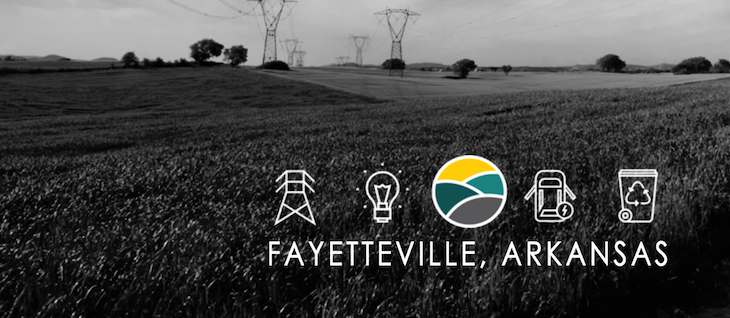The Fayetteville City Council unanimously voted Tuesday (Nov. 20) to approve a
trilateral agreement among the city, Ozarks Electric Cooperative
and Today’s Power Inc. (TPI) for the development, construction and
operation of Arkansas’s largest solar power system on municipal land.
City officials in a news release said it will be the only
solar power system in Arkansas with onsite utility-scale storage.
In addition to the expected $6 million saved in energy costs
over the project’s 20-year lifespan, the city anticipates a complete return on
its investment in a little more than three years. The project will also raise
clean energy consumption by city facilities from 16% to 72%, taking a huge step
toward Fayetteville’s goal of 100% clean energy by 2030.
TPI will manage project construction and provide full
operations and maintenance of the solar arrays and energy storage facilities
during the 20-year agreement, leasing the necessary acreage from the city. The
systems will operate on Fayetteville’s two water treatment facility properties
— the Paul R. Noland Wastewater Treatment Facility in east Fayetteville and the
Westside Water Treatment Facility. Ozarks Electric will upgrade and maintain
existing electricity connections at the sites. The city will continue its
income-producing hay and bio-solid operations at the Noland facility.
The capacity of the entire system at both locations totals
10 MW of solar power generation and 24 MWh of battery storage on a combined
land mass of 87 acres, according to the release. For maximum solar exposure,
solar panels will be installed on a sun tracking system that produces 15% more
electricity than stationary mounts. Currently, Fayetteville’s wastewater
treatment plants are the city’s two largest electricity consuming accounts at
approximately 67% of the city’s overall electricity consumption. Through solar
net metering, the system will power 100% of the treatment facilities.
Each treatment facility will have systems with two main
components, according to the release — the array of solar photovoltaic panels
and the battery storage facility. The array will be able to generate 5 MW (five
megawatts) of electricity. Energy produced by the solar panels will be
dispersed to power the wastewater treatment facilities. Excess electricity will
be sent to the electrical grid for use by Ozarks Electric, or relayed to the
battery storage facility, capable of storing 12 MWh of electricity.
Ozarks Electric will use stored electricity to provide power
to their members during peak-consumption times like summer. Because of the
unique nature of this project, cooperative members will continue to benefit from
reliable service without subsidies or associated rate impacts.
In 2016, Fayetteville joined the O.N.E. (Ozarks Natural
Energy) solar community project when it purchased 100 shares of solar
energy from Ozarks Electric’s one-megawatt solar array located along
Highway 412 near Springdale. Ozarks Electric continues to welcome and
encourages new members to join the O.N.E. solar community. TPI constructed and
currently operates that facility.
As part of the long-term agreement, the city has negotiated
a 20-year solar services contract with TPI at a marginally lower energy price
than the current retail rate. The city anticipates its portion of the project’s
initial capital site improvement cost to total $560,818. Calculating estimated
future annual solar electricity costs and minimal hay and bio-solid revenue
loss against the wastewater treatment facilities current standard electricity
costs, the city expects an annual savings of $182,021.
Due to the reduced fixed cost of solar electricity and the
anticipated increasing cost for standard retail electricity, officials
estimated the project will save the city $6 million dollars over 20 years.
“This year, the City Council showed great vision and
leadership for their residents when they approved the Energy Action Plan in January 2018,”
Mayor Lioneld Jordan said in a statement.
“Through this important agreement
with Today’s Power and Ozarks Electric, the Fayetteville community moves closer
to several goals in the plan. The approval of this solar power and storage
project creates the renewable energy our community desires, uses existing
City-owned assets more efficiently, adds jobs and promotes economic
development.”
Assuming no regulatory, review or equipment delays,
construction is expected to begin in spring 2019 and be complete by September
2019. Operations will begin shortly thereafter.
Fayetteville’s Energy
Action Plan (EAP) addresses the local effects of climate change,
energy efficiency efforts, and clean energy production. It is the first to be
adopted in Arkansas and the 54th in the nation.


No comments:
Post a Comment